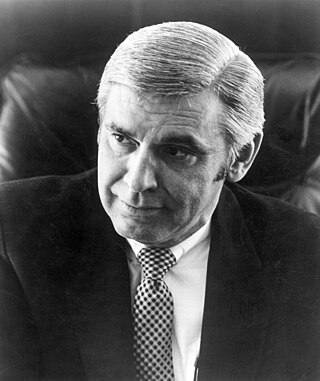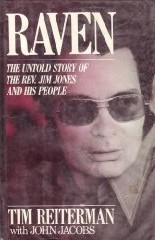Jonestown was the site of the 1978 mass suicide-and-murder of the Peoples Temple cult in northwestern Guyana.
Jonestown may also refer to:
Johnstown may refer to:
Middletown may refer to:
Evergreen refers to plants that have leaves all year round.

The Peoples Temple of the Disciples of Christ, originally Peoples Temple Full Gospel Church and commonly shortened to Peoples Temple, was an American new religious organization which existed between 1954 and 1978 and was affiliated with the Christian Church. Founded by Jim Jones in Indianapolis, Indiana, the Peoples Temple spread a message that combined elements of Christianity with communist and socialist ideology, with an emphasis on racial equality. After Jones moved the group to California in the 1960s and established several locations throughout the state, including its headquarters in San Francisco, the Temple forged ties with many left-wing political figures and claimed to have 20,000 members.

The Peoples Temple Agricultural Project, better known by its informal name "Jonestown", was a remote settlement in Guyana established by the Peoples Temple, an American cult under the leadership of Jim Jones. Jonestown became internationally infamous when, on November 18, 1978, a total of 918 people died at the settlement, at the nearby airstrip in Port Kaituma, and at a Temple-run building in Georgetown, Guyana's capital city. The name of the settlement became synonymous with the incidents at those locations.

James Warren Jones, better known as Jim Jones, was an American mass murderer who led the Peoples Temple between 1955 and 1978. In what he termed "revolutionary suicide", a term he took from the novel by the same name by Huey Newton, Jones and the members of his inner circle planned and orchestrated a mass murder-suicide in his remote jungle commune at Jonestown, Guyana, on November 18, 1978. Jones and the events that occurred at Jonestown have had a defining influence on society's perception of cults.

Leo Joseph Ryan Jr. was an American teacher and politician. A member of the Democratic Party, he served as the U.S. representative from California's 11th congressional district from 1973 until his assassination during the Jonestown massacre in 1978. Before that, he served in the California State Assembly, representing the state's 27th district.
James Jones may refer to:
Don Harris was an NBC News correspondent who was killed after departing Jonestown, an agricultural commune owned by the Peoples Temple in Guyana. On November 18, 1978, he and four others were killed by gunfire by Temple members at a nearby airstrip in Port Kaituma, Guyana. Their murders preceded the death of 909 Temple members in Jonestown and four Temple members in Georgetown, Guyana.

Jonestown: The Life and Death of Peoples Temple, is a 2006 documentary film made by Firelight Media, produced and directed by Stanley Nelson. The documentary reveals new footage of the incidents surrounding the Peoples Temple and its leader Jim Jones who led over 900 members of his religious group to a settlement in Guyana called Jonestown, where he orchestrated a mass suicide with poisoned Flavor Aid, in November 1978. It is in the form of a narrative with interviews with former Temple members, Jonestown survivors, and people who knew Jones.

Guyana Tragedy: The Story of Jim Jones, also called The Mad Messiah, is a 1980 television miniseries about the Peoples Temple led by Jim Jones, and their 1978 mass suicide at Jonestown. Based on the book by Charles A. Krause, entitled Guyana Massacre: The Eyewitness Account, the film was originally shown on television on April 15, 1980.
Jonestown: Paradise Lost is a 2007 documentary television film on the History Channel about the final days of Jonestown, the Peoples Temple, and Jim Jones. From eyewitness and survivor accounts, the program recreates the last week before the mass murder-suicide on November 18, 1978.
Georgetown or George Town may refer to:
Crime of the century is a popular idiom to describe sensational criminal cases.
Unity may refer to:

Raven: The Untold Story of the Rev. Jim Jones and His People details the life and ultimate demise of Jim Jones and the Peoples Temple. Written by journalist Tim Reiterman, the book reviews the history of the Peoples Temple. The book includes numerous interviews, audio tapes and documents among its hundreds of sources.
Timothy Oliver Stoen is an American attorney best known for his central role as a member of the Peoples Temple, and as an opponent of the group during a multi-year custody battle over his six-year-old son, John. The custody battle triggered a chain of events which led to U.S. Representative Leo Ryan's investigation into the Temple's remote settlement of Jonestown in northern Guyana, which became internationally notorious in 1978 after 918 people – including Stoen's son – died in the settlement and on a nearby airstrip. Stoen continued to work as a deputy district attorney in Mendocino County, California, where he was assigned to the District Attorney's Fort Bragg office. Stoen later joined the Mendocino County Public Defenders. He is now in the private practice of law.

The Peoples Temple, the new religious movement which came to be known for the mass killings at Jonestown, was headquartered in San Francisco, California, United States from the early to mid-1970s until the Temple's move to Guyana in 1977. During this period, the Temple and its founder, Reverend Jim Jones, rose to national prominence thanks to Jones' interest in social and political causes, and wielded a significant amount of influence in San Francisco's city government.

The Brian Jonestown Massacre is an American musical project and band led and started by Anton Newcombe. It was formed in San Francisco in 1990.
Jim Jones was a cult leader who on November 18, 1978, orchestrated the mass murder suicide of 909 members of his commune in Jonestown, Guyana. Since the events of the Jonestown Massacre, a massive amount of literature and study has been produced on the subject. Numerous documentaries, films, books, poetry, music and art have covered or been inspired by the events of Jonestown. Jim Jones and the events at Jonestown has had a defining influence on society's perception of cults. The widely known expression "Drinking the Kool-Aid" originated in the events at Jonestown, although the specific beverage used at the massacre was Flavor Aid rather than Kool-Aid.